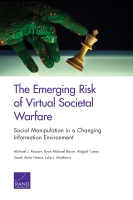The Emerging Risk of Virtual Societal Warfare

The evolution of advanced information environments is rapidly creating a new category of possible cyberaggression that involves efforts to manipulate or disrupt the information foundations of the effective functioning of economic and social systems. RAND researchers are calling this growing threat virtual societal warfare in an analysis of its characteristics and implications for the future.
To understand the risk of virtual societal warfare, the authors surveyed evidence in a range of categories to sketch out some initial contours of how these techniques might evolve in the future. They grounded the assessment in (1) detailed research on trends in the changing character of the information environment in the United States and other advanced democracies; (2) the insights of social science research on attitudes and beliefs; and (3) developments in relevant emerging technologies that bear on the practices of hostile social manipulation and its more elaborate and dangerous cousin, virtual societal warfare. The authors then provide three scenarios for how social manipulation could affect advanced societies over the next decade.
The analysis suggests an initial set of characteristics that can help define the emerging challenge of virtual societal warfare, including that national security will increasingly rely on a resilient information environment and a strong social topography, and that conflict will increasingly be waged between and among networks.
No comments:
Post a Comment